Human Resource management 14
- 格式:ppt
- 大小:1.19 MB
- 文档页数:56
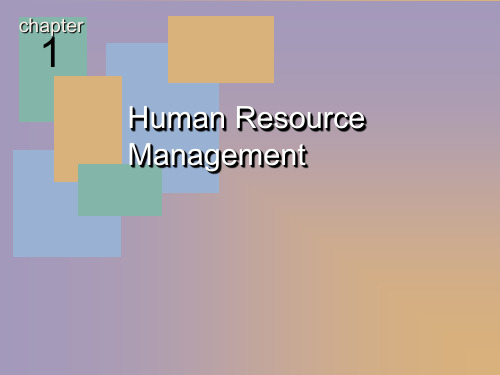

Human Resource Management人力资源管理Teaching Objectives•What Is Human Resources Management•Human Resource Planning 人力资源规划•Recruitment 招聘•Training and Developing 培训和培养•Compensation 报酬•How to Keep Employees Motivated 如何激发员工工作热情•Human resources are the people that operate an organization.•Human Resource Management is the management of an organization’s “human capital” or “intellectual assets”.What Is Human Resources Management?•The Human Resource Management (HRM) process is an ongoing procedure that tries to keep the right people in the right positions. It includes human resource planning, recruitment, selection, socialization, training and development, performance appraisal, promotions, transfers, demotions, separations, and compensation.人力资源一般指有能力并愿意为社会工作的经济活动人口。
人力资源管理是管理学的一个崭新的和重要的领域。
它是指组织对员工的有效管理和使用的思想行为,主要包括人力资源规划、招聘、选拔、定位、培训和培养、业绩评价、提拔、调动、降级、解雇以及酬劳等活动。
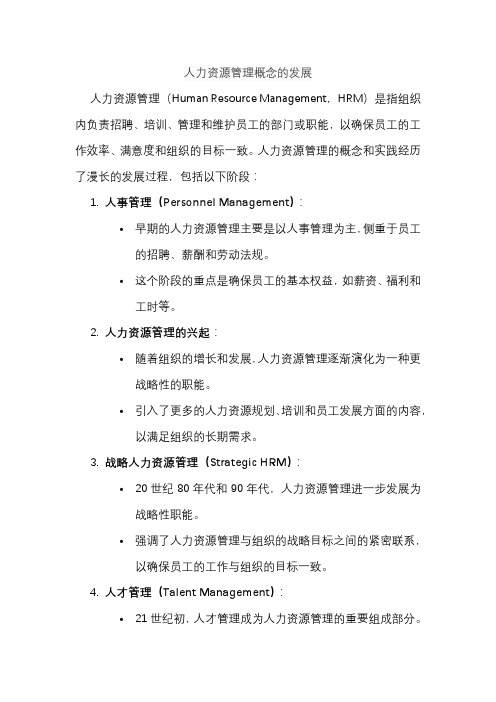
人力资源管理概念的发展人力资源管理(Human Resource Management,HRM)是指组织内负责招聘、培训、管理和维护员工的部门或职能,以确保员工的工作效率、满意度和组织的目标一致。
人力资源管理的概念和实践经历了漫长的发展过程,包括以下阶段:1.人事管理(Personnel Management):•早期的人力资源管理主要是以人事管理为主,侧重于员工的招聘、薪酬和劳动法规。
•这个阶段的重点是确保员工的基本权益,如薪资、福利和工时等。
2.人力资源管理的兴起:•随着组织的增长和发展,人力资源管理逐渐演化为一种更战略性的职能。
•引入了更多的人力资源规划、培训和员工发展方面的内容,以满足组织的长期需求。
3.战略人力资源管理(Strategic HRM):•20世纪80年代和90年代,人力资源管理进一步发展为战略性职能。
•强调了人力资源管理与组织的战略目标之间的紧密联系,以确保员工的工作与组织的目标一致。
4.人才管理(Talent Management):•21世纪初,人才管理成为人力资源管理的重要组成部分。
•强调了员工的发展和激励,以吸引、培养和留住优秀的人才。
5.数字化和人工智能的影响:•当今,数字化和人工智能技术对人力资源管理产生深远影响。
•通过人力资源信息系统(HRIS)、人工智能筛选工具和大数据分析等技术,人力资源管理变得更加智能和高效。
6.员工幸福和多元化:•当前的趋势是关注员工的幸福和多元化,以确保员工在工作中获得满足感,提高员工忠诚度和创造力。
•强调了包容性和多元文化,以反映不同背景和观点的员工。
7.全球化人力资源管理:•全球化趋势要求人力资源管理考虑全球范围内的员工和文化差异。
•全球人力资源管理强调了跨国企业的挑战,如文化差异、法规遵从和跨国员工的管理。
人力资源管理的概念和实践将继续发展,以适应不断变化的组织和社会需求。
现代人力资源管理强调员工的发展、创新和与组织目标的一致性,同时积极应对数字化和全球化的挑战。

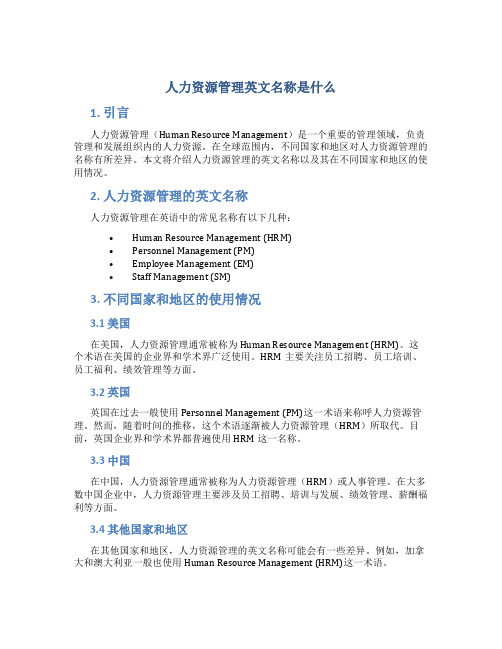
人力资源管理英文名称是什么1. 引言人力资源管理(Human Resource Management)是一个重要的管理领域,负责管理和发展组织内的人力资源。
在全球范围内,不同国家和地区对人力资源管理的名称有所差异。
本文将介绍人力资源管理的英文名称以及其在不同国家和地区的使用情况。
2. 人力资源管理的英文名称人力资源管理在英语中的常见名称有以下几种:•Human Resource Management (HRM)•Personnel Management (PM)•Employee Management (EM)•Staff Management (SM)3. 不同国家和地区的使用情况3.1 美国在美国,人力资源管理通常被称为Human Resource Management (HRM)。
这个术语在美国的企业界和学术界广泛使用。
HRM主要关注员工招聘、员工培训、员工福利、绩效管理等方面。
3.2 英国英国在过去一般使用Personnel Management (PM)这一术语来称呼人力资源管理。
然而,随着时间的推移,这个术语逐渐被人力资源管理(HRM)所取代。
目前,英国企业界和学术界都普遍使用HRM这一名称。
3.3 中国在中国,人力资源管理通常被称为人力资源管理(HRM)或人事管理。
在大多数中国企业中,人力资源管理主要涉及员工招聘、培训与发展、绩效管理、薪酬福利等方面。
3.4 其他国家和地区在其他国家和地区,人力资源管理的英文名称可能会有一些差异。
例如,加拿大和澳大利亚一般也使用Human Resource Management (HRM)这一术语。
4. 总结人力资源管理在全球范围内是一个重要的管理领域。
在不同国家和地区,人力资源管理的英文名称可能存在差异。
然而,无论名称如何,其核心目标都是有效地管理和发展组织内的人力资源。
通过不断学习和实践,我们可以不断提升人力资源管理的能力,为企业的发展做出贡献。
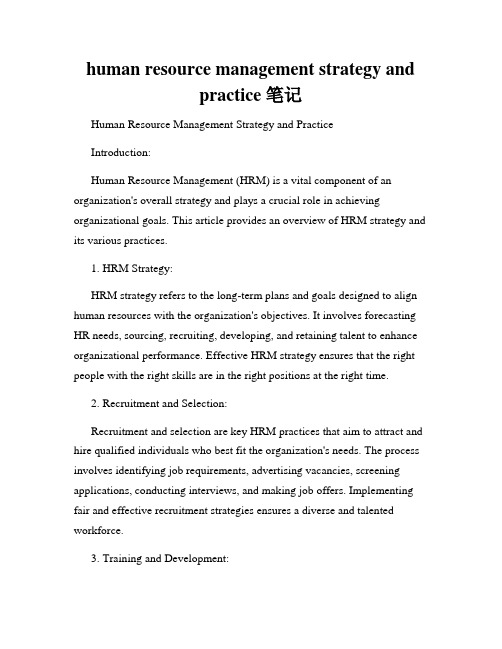
human resource management strategy andpractice 笔记Human Resource Management Strategy and PracticeIntroduction:Human Resource Management (HRM) is a vital component of an organization's overall strategy and plays a crucial role in achieving organizational goals. This article provides an overview of HRM strategy and its various practices.1. HRM Strategy:HRM strategy refers to the long-term plans and goals designed to align human resources with the organization's objectives. It involves forecasting HR needs, sourcing, recruiting, developing, and retaining talent to enhance organizational performance. Effective HRM strategy ensures that the right people with the right skills are in the right positions at the right time.2. Recruitment and Selection:Recruitment and selection are key HRM practices that aim to attract and hire qualified individuals who best fit the organization's needs. The process involves identifying job requirements, advertising vacancies, screening applications, conducting interviews, and making job offers. Implementing fair and effective recruitment strategies ensures a diverse and talented workforce.3. Training and Development:Training and development programs assist employees in acquiring new skills, updating knowledge, and improving existing abilities. These HRM practices contribute to enhancing employee performance and job satisfaction. Organizations should provide various training methods, such as workshops, on-the-job training, and e-learning, to address different learning styles and needs.4. Performance Management:Performance management involves setting clear performance expectations, measuring employee performance, providing feedback, and identifying areas for improvement. It enables organizations to align individual goals with organizational objectives, promote accountability, and recognize high performers. Effective performance management systems provide regular evaluations, constructive feedback, and opportunities for growth and development.5. Compensation and Benefits:A well-designed compensation and benefits system is essential for attracting, motivating, and retaining employees. It includes salary structure, incentives, bonuses, and benefits such as healthcare, retirement plans, and work-life balance initiatives. Offering competitive compensation packages helps in attracting top talent and ensures employee satisfaction and engagement.6. Employee Relations:Employee relations focus on fostering positive relationships between employees and management. HRM practices in this area aim to create ahealthy work environment, resolve conflicts, and maintain a fair and respectful workplace. Open communication channels, grievance procedures, and employee satisfaction surveys are important tools for managing employee relations effectively.7. Diversity and Inclusion:Diversity and inclusion are integral to HRM strategy and practice. Organizations that value diversity benefit from access to a broader range of ideas, perspectives, and experiences. HRM practices in this domain involve promoting diversity in recruitment, fostering inclusive workplace cultures, and providing equitable opportunities for all employees.8. Talent Management:Talent management aims to identify, develop, and retain high-potential employees who can contribute to the organization's long-term success. HRM practices in talent management include succession planning, leadership development programs, and career pathways. Effective talent management ensures a pipeline of capable leaders and reduces the risk of talent gaps.Conclusion:Human Resource Management strategy and practice are essential for optimizing organizational performance, attracting and retaining top talent, and creating a positive work environment. By aligning HRM practices with the organization's objectives, organizations can enhance employee engagement, productivity, and overall success. Adopting effective HRM strategies leads to better resource utilization, improved employee satisfaction, and ultimately, greater business success.。

人力资源管理的英语英文回答:Human resource management (HRM) is the process of managing people in an organization to achieve its goals. It involves a wide range of activities, including:Recruitment and selection: Identifying and hiring the best candidates for open positions.Compensation and benefits: Determining and managing employees' pay and benefits.Training and development: Providing employees with the skills and knowledge they need to perform their jobs effectively.Performance management: Assessing and evaluating employees' performance.Employee relations: Managing relationships between employees and the organization.HRM is an essential function in any organization. It helps to ensure that the organization has the right people in place to achieve its goals, and that those people are motivated and engaged.中文回答:人力资源管理是为达到组织目标而管理组织中员工的过程。
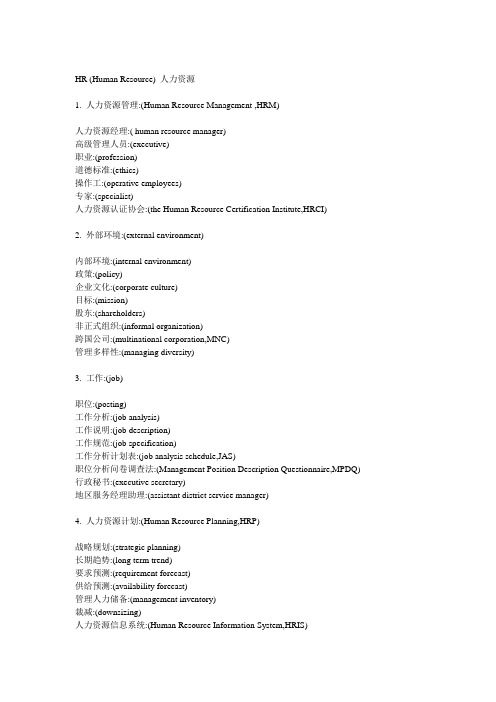
HR (Human Resource) 人力资源1. 人力资源管理:(Human Resource Management ,HRM)人力资源经理:( human resource manager)高级管理人员:(executive)职业:(profession)道德标准:(ethics)操作工:(operative employees)专家:(specialist)人力资源认证协会:(the Human Resource Certification Institute,HRCI)2. 外部环境:(external environment)内部环境:(internal environment)政策:(policy)企业文化:(corporate culture)目标:(mission)股东:(shareholders)非正式组织:(informal organization)跨国公司:(multinational corporation,MNC)管理多样性:(managing diversity)3. 工作:(job)职位:(posting)工作分析:(job analysis)工作说明:(job description)工作规范:(job specification)工作分析计划表:(job analysis schedule,JAS)职位分析问卷调查法:(Management Position Description Questionnaire,MPDQ) 行政秘书:(executive secretary)地区服务经理助理:(assistant district service manager)4. 人力资源计划:(Human Resource Planning,HRP)战略规划:(strategic planning)长期趋势:(long term trend)要求预测:(requirement forecast)供给预测:(availability forecast)管理人力储备:(management inventory)裁减:(downsizing)人力资源信息系统:(Human Resource Information System,HRIS)5. 招聘:(recruitment)员工申请表:(employee requisition)招聘方法:(recruitment methods)内部提升:(Promotion From Within ,PFW)工作公告:(job posting)广告:(advertising)职业介绍所:(employment agency)特殊事件:(special events)实习:(internship)6. 选择:(selection)选择率:(selection rate)简历:(resume)标准化:(standardization)有效性:(validity)客观性:(objectivity)规范:(norm)录用分数线:(cutoff score)准确度:(aiming)业务知识测试:(job knowledge tests)求职面试:(employment interview)非结构化面试:(unstructured interview)结构化面试:(structured interview)小组面试:(group interview)职业兴趣测试:(vocational interest tests)会议型面试:(board interview)7. 组织变化与人力资源开发人力资源开发:(Human Resource Development,HRD) 培训:(training)开发:(development)定位:(orientation)训练:(coaching)辅导:(mentoring)经营管理策略:(business games)案例研究:(case study)会议方法:(conference method)角色扮演:(role playing)工作轮换:(job rotating)在职培训:(on-the-job training ,OJT)媒介:(media)8. 企业文化与组织发展企业文化:(corporate culture)组织发展:(organization development,OD)调查反馈:(survey feedback)质量圈:(quality circles)目标管理:(management by objective,MBO)全面质量管理:(Total Quality Management,TQM) 团队建设:(team building)9. 职业计划与发展职业:(career)职业计划:(career planning)职业道路:(career path)职业发展:(career development)自我评价:(self-assessment)职业动机:(career anchors)10. 绩效评价绩效评价:(Performance Appraisal,PA)小组评价:(group appraisal)业绩评定表:(rating scales method)关键事件法:(critical incident method)排列法:(ranking method)平行比较法:(paired comparison)硬性分布法:(forced distribution method)晕圈错误:(halo error)宽松:(leniency)严格:(strictness)3600反馈:(360-degree feedback)叙述法:(essay method)集中趋势:(central tendency)11. 报酬与福利报酬:(compensation)直接经济报酬:(direct financial compensation)间接经济报酬:(indirect financial compensation) 非经济报酬:(no financial compensation)公平:(equity)外部公平:(external equity)内部公平:(internal equity)员工公平:(employee equity)小组公平:(team equity)工资水平领先者:(pay leaders)现行工资率:(going rate)工资水平居后者:(pay followers)劳动力市场:(labor market)工作评价:(job evaluation)排列法:(ranking method)分类法:(classification method)因素比较法:(factor comparison method)评分法:(point method)海氏指示图表个人能力分析法:(Hay Guide Chart-profile Method) 工作定价:(job pricing)工资等级:(pay grade)工资曲线:(wage curve)工资幅度:(pay range)12. 福利和其它报酬问题福利(间接经济补偿)员工股权计划:(employee stock ownership plan,ESOP)值班津贴:(shift differential)奖金:(incentive compensation)分红制:(profit sharing)13. 安全与健康的工作环境安全:(safety)健康:(health)频率:(frequency rate)紧张:(stress)角色冲突:(role conflict)催眠法:(hypnosis)酗酒:(alcoholism)14. 员工和劳动关系工会:(union)地方工会:(local union)行业工会:(craft union)产业工会:(industrial union)全国工会:(national union)谈判组:(bargaining union)劳资谈判:(collective bargaining)仲裁:(arbitration)罢工:(strike)内部员工关系:(internal employee relations)纪律:(discipline)纪律处分:(disciplinary action)申诉:(grievance)降职:(demotion)调动:(transfer)晋升:(promotion)HR常用英語~~Marketing and Sales (市場与銷售部分)Vice-President of Sales 销銷售副總裁Senior Customer Manager 高級客户經理Sales Manager 销銷售經理Regional Sales Manager 地区銷售經理Merchandising Manager 采購經理Sales Assistant 销銷售助理Wholesale Buyer 批發采購員购员Tele-Interviewer 电话调電話調查員员Real Estate Appraiser 房地產評估师Marketing Consultant 市場顧客场顾问Marketing and Sales Director 市場与銷售總監总监Market Research Analyst 市場調查分析員员Manufacturer\'s Representative 厂家代表Director of Subsidiary Rights 分公司權利總監总监Sales Representative 销銷售代表Assistant Customer Executive 客户管理助理Marketing Intern 市場实習习Marketing Director 市場總監场总监Insurance Agent 保險代理人Customer Manager 客户經理Vice-President of Marketing 市場副總裁Regional Customer Manager 地区客户經理Sales Administrator 销銷售主管Telemarketing Director 電話銷售總監总监Advertising Manager 广告經理Travel Agent 旅行代办員员Salesperson 销銷售員员Telemarketer 电话销電話銷售員员Sales Executive 销銷售执行者Marketing Assistant 市場助理Retail Buyer 零售采購員购员Real Estate Manager 房地產經理Real Estate Broker 房地產經紀人Purchasing Agent 采購代理Product Developer 产產品開發开发Marketing Manager 市場經理Advertising Coordinator 广告协調員调员Advertising Assistant 广告助理Ad Copywriter(Direct Mail) 广告文撰写人Customer Representative 客户代表Computers and Mathematics(計算机部分)Manager of Network Administration 网絡管理經理MIS Manager 电脑電腦部經理Project Manager 项項目經理Technical Engineer 技术工程师Developmental Engineer 开開發工程师Systems Programmer 系統程序員员Administrator 局域网管理員员Operations Analyst 操作分析Computer Operator 电脑電腦操作員员Product Support Manager 产產品支持經理Computer Operations Supervisor 电脑電腦操作主管Director of InFORMation Services 信息服務主管Systems Engineer 系統工程师Hardware Engineer 硬件工程师Applications Programmer 应應用軟件程序員员InFORMation Analyst 信息分析LAN Systems Analyst 系統分析Statistician 統計員统计员Human Resources(人力資源部分)Director of Human Resources 人力資源總監总监Assistant Personnel Officer 人事助理Compensation Manager 薪酬經理Employment Consultant 招募顧問顾问Facility Manager 后勤經理Job Placement Officer 人員配置專員专员Labor Relations Specialist 劳动關系專員专员Recruiter 招聘人員员Training Specialist 培訓專員训专员Vice-President of Human Resources 人力資源副總裁Assistant Vice-President of Human Resources 人力資源副總裁助理Personnel Manager 职员经職員經理Benefits Coordinator 员員工福利协調員调员Employer Relations Representative 员員工關系代表Personnel Consultant 员員工顧客問问Training Coordinator 培訓协調員调员Executive and Managerial(管理部分)Chief Executive Officer(CEO) 首席执行官Director of Operations 运運營總監营总监Vice-President 副總裁Branch Manager 部門經理Retail Store Manager 零售店經理HMO Product Manager 产產品經理Operations Manager 操作經理Assistant Vice-President 副總裁助理Field Assurance Coordinator 土地担保协調員调员Management Consultant 管理顧問顾问District Manager 市区經理Hospital Administrator 医院管理Import/Export Manager 进進出口管理Insurance Claims Controller 保險認領管理員员Program Manager 程序管理經理Insurance Coordinator 保險协調員调员Project Manager 项項目經理Inventory Control Manager 库庫存管理經理Regional Manager 区域經理Chief Operations Officer(COO) 首席運營官General Manager 总经總經理Executive Marketing Director 市場行政總監总监Controller(International) 国際監管Food Service Manager 食品服務經理Production Manager 生產經理Administrator 医序保險管理Property Manager 房地產經理Claims Examiner 主考官Controller(General) 管理員员Service Manager 服務經理Manufacturing Manager 制造業經理Vending Manager 售買經理Telecommunications Manager 电電信業經理Transportation Manager 运输经運輸經理Warehouse Manager 仓库经倉庫經理Assistant Store Manager 商店經理助理Manager(Non-Profit and Charities) 非盈利性慈善机构管理做管理的人必备的英文单词目标mission/ objective集体目标group objective内部环境internal environment外部环境external environment计划planning组织organizing人事staffing领导leading控制controlling步骤process原理principle方法technique经理manager总经理general manager行政人员administrator主管人员supervisor企业enterprise商业business产业industry公司company效果effectiveness效率efficiency企业家entrepreneur权利power职权authority职责responsibility科学管理scientific management现代经营管理modern operational management 行为科学behavior science生产率productivity激励motivate动机motive法律law法规regulation经济体系economic system管理职能managerial function产品product服务service利润profit满意satisfaction归属affiliation尊敬esteem自我实现self-actualization人力投入human input盈余surplus收入income成本cost资本货物capital goods机器machinery设备equipment建筑building存货inventory经验法the empirical approach人际行为法the interpersonal behavior approach集体行为法the group behavior approach协作社会系统法the cooperative social systems approach 社会技术系统法the social-technical systems approach 决策理论法the decision theory approach数学法the mathematical approach系统法the systems approach随机制宜法the contingency approach管理任务法the managerial roles approach经营法the operational approach人际关系human relation心理学psychology态度attitude压力pressure冲突conflict招聘recruit鉴定appraisal选拔select培训train报酬compensation授权delegation of authority协调coordinate业绩performance考绩制度merit system表现behavior下级subordinate偏差deviation检验记录inspection record误工记录record of labor-hours lost销售量sales volume产品质量quality of products先进技术advanced technology顾客服务customer service策略strategy结构structure(3)领先性primacy普遍性pervasiveness忧虑fear忿恨resentment士气morale解雇layoff批发wholesale零售retail程序procedure规则rule规划program预算budget共同作用synergy大型联合企业conglomerate资源resource购买acquisition增长目标growth goal专利产品proprietary product竞争对手rival晋升promotion管理决策managerial decision商业道德business ethics有竞争力的价格competitive price 供货商supplier小贩vendor利益冲突conflict of interests派生政策derivative policy开支帐户expense account批准程序approval procedure病假sick leave休假vacation工时labor-hour机时machine-hour资本支出capital outlay现金流量cash flow工资率wage rate税收率tax rate股息dividend现金状况cash position资金短缺capital shortage总预算overall budget资产负债表balance sheet可行性feasibility投入原则the commitment principle 投资回报return on investment生产能力capacity to produce实际工作者practitioner最终结果end result业绩performance个人利益personal interest福利welfare市场占有率market share创新innovation生产率productivity利润率profitability社会责任public responsibility董事会board of director组织规模size of the organization组织文化organizational culture目标管理management by objectives 评价工具appraisal tool激励方法motivational techniques 控制手段control device个人价值personal worth优势strength弱点weakness机会opportunity威胁threat个人责任personal responsibility顾问counselor定量目标quantitative objective定性目标qualitative objective可考核目标verifiable objective优先priority工资表payroll(4)策略strategy政策policy灵活性discretion多种经营diversification评估assessment一致性consistency应变策略consistency strategy公共关系public relation价值value抱负aspiration偏见prejudice审查review批准approval主要决定major decision分公司总经理division general manager 资产组合距阵portfolio matrix明星star问号question mark现金牛cash cow赖狗dog采购procurement人口因素demographic factor地理因素geographic factor公司形象company image产品系列product line合资企业joint venture破产政策liquidation strategy紧缩政策retrenchment strategy战术tactics(5)追随followership个性individuality性格personality安全safety自主权latitude悲观的pessimistic静止的static乐观的optimistic动态的dynamic灵活的flexible抵制resistance敌对antagonism折中eclectic(6)激励motivation潜意识subconscious地位status情感affection欲望desire压力pressure满足satisfaction自我实现的需要needs for self-actualization 尊敬的需要esteem needs归属的需要affiliation needs安全的需要security needs生理的需要physiological needs维持maintenance保健hygiene激励因素motivator概率probability强化理论reinforcement theory反馈feedback奖金bonus股票期权stock option劳资纠纷labor dispute缺勤率absenteeism人员流动turnover奖励reward(7)特许经营franchise热诚zeal信心confidence鼓舞inspire要素ingredient忠诚loyalty奉献devotion作风style品质trait适应性adaptability进取性aggressiveness热情enthusiasm毅力persistence人际交往能力interpersonal skills行政管理能力administrative ability智力intelligence专制式领导autocratic leader民主式领导democratic leader自由放任式领导free-rein leader管理方格图the managerial grid工作效率work efficiency服从obedience领导行为leader behavior支持型领导supportive leadership参与型领导participative leadership指导型领导instrumental leadership成就取向型领导achievement-oriented leadershipHR (Human Resource) 人力资源1. 人力资源管理:(Human Resource Management ,HRM)人力资源经理:( human resource manager)高级管理人员:(executive)职业:(profession)道德标准:(ethics)操作工:(operative employees)专家:(specialist)人力资源认证协会:(the Human Resource Certification Institute,HRCI)2. 外部环境:(external environment)内部环境:(internal environment)政策:(policy)企业文化:(corporate culture)目标:(mission)股东:(shareholders)非正式组织:(informal organization)跨国公司:(multinational corporation,MNC)管理多样性:(managing diversity)3. 工作:(job)职位:(posting)工作分析:(job analysis)工作说明:(job description)工作规范:(job specification)工作分析计划表:(job analysis schedule,JAS)职位分析问卷调查法:(Management Position Description Questionnaire,MPDQ) 行政秘书:(executive secretary)地区服务经理助理:(assistant district service manager)4. 人力资源计划:(Human Resource Planning,HRP)战略规划:(strategic planning)长期趋势:(long term trend)要求预测:(requirement forecast)供给预测:(availability forecast)管理人力储备:(management inventory)裁减:(downsizing)人力资源信息系统:(Human Resource Information System,HRIS) 5. 招聘:(recruitment)员工申请表:(employee requisition)招聘方法:(recruitment methods)内部提升:(Promotion From Within ,PFW)工作公告:(job posting)广告:(advertising)职业介绍所:(employment agency)特殊事件:(special events)实习:(internship)6. 选择:(selection)选择率:(selection rate)简历:(resume)标准化:(standardization)有效性:(validity)客观性:(objectivity)规范:(norm)录用分数线:(cutoff score)准确度:(aiming)业务知识测试:(job knowledge tests)求职面试:(employment interview)非结构化面试:(unstructured interview)结构化面试:(structured interview)小组面试:(group interview)职业兴趣测试:(vocational interest tests)会议型面试:(board interview)7. 组织变化与人力资源开发人力资源开发:(Human Resource Development,HRD)培训:(training)开发:(development)定位:(orientation)训练:(coaching)辅导:(mentoring)经营管理策略:(business games)案例研究:(case study)会议方法:(conference method)角色扮演:(role playing)工作轮换:(job rotating)在职培训:(on-the-job training ,OJT)媒介:(media)8. 企业文化与组织发展企业文化:(corporate culture)组织发展:(organization development,OD)调查反馈:(survey feedback)质量圈:(quality circles)目标管理:(management by objective,MBO)全面质量管理:(Total Quality Management,TQM) 团队建设:(team building)9. 职业计划与发展职业:(career)职业计划:(career planning)职业道路:(career path)职业发展:(career development)自我评价:(self-assessment)职业动机:(career anchors)10. 绩效评价绩效评价:(Performance Appraisal,PA)小组评价:(group appraisal)业绩评定表:(rating scales method)关键事件法:(critical incident method)排列法:(ranking method)平行比较法:(paired comparison)硬性分布法:(forced distribution method)晕圈错误:(halo error)宽松:(leniency)严格:(strictness)3600反馈:(360-degree feedback)叙述法:(essay method)集中趋势:(central tendency)11. 报酬与福利报酬:(compensation)直接经济报酬:(direct financial compensation)间接经济报酬:(indirect financial compensation)非经济报酬:(no financial compensation)公平:(equity)外部公平:(external equity)内部公平:(internal equity)员工公平:(employee equity)小组公平:(team equity)工资水平领先者:(pay leaders)现行工资率:(going rate)工资水平居后者:(pay followers)劳动力市场:(labor market)工作评价:(job evaluation)排列法:(ranking method)分类法:(classification method)因素比较法:(factor comparison method)评分法:(point method)海氏指示图表个人能力分析法:(Hay Guide Chart-profile Method) 工作定价:(job pricing)工资等级:(pay grade)工资曲线:(wage curve)工资幅度:(pay range)12. 福利和其它报酬问题福利(间接经济补偿)员工股权计划:(employee stock ownership plan,ESOP)值班津贴:(shift differential)奖金:(incentive compensation)分红制:(profit sharing)13. 安全与健康的工作环境安全:(safety)健康:(health)频率:(frequency rate)紧张:(stress)角色冲突:(role conflict)催眠法:(hypnosis)酗酒:(alcoholism)14. 员工和劳动关系工会:(union)地方工会:(local union)行业工会:(craft union)产业工会:(industrial union)全国工会:(national union)谈判组:(bargaining union)劳资谈判:(collective bargaining)仲裁:(arbitration)罢工:(strike)内部员工关系:(internal employee relations)纪律:(discipline)纪律处分:(disciplinary action)申诉:(grievance)降职:(demotion)调动:(transfer)晋升:(promotion)HR常用英語~~Marketing and Sales (市場与銷售部分)Vice-President of Sales 销銷售副總裁Senior Customer Manager 高級客户經理Sales Manager 销銷售經理Regional Sales Manager 地区銷售經理Merchandising Manager 采購經理Sales Assistant 销銷售助理Wholesale Buyer 批發采購員购员Tele-Interviewer 电话调電話調查員员Real Estate Appraiser 房地產評估师Marketing Consultant 市場顧客场顾问Marketing and Sales Director 市場与銷售總監总监Market Research Analyst 市場調查分析員员Manufacturer\'s Representative 厂家代表Director of Subsidiary Rights 分公司權利總監总监Sales Representative 销銷售代表Assistant Customer Executive 客户管理助理Marketing Intern 市場实習习Marketing Director 市場總監场总监Insurance Agent 保險代理人Customer Manager 客户經理Vice-President of Marketing 市場副總裁Regional Customer Manager 地区客户經理Sales Administrator 销銷售主管Telemarketing Director 電話銷售總監总监Advertising Manager 广告經理Travel Agent 旅行代办員员Salesperson 销銷售員员Telemarketer 电话销電話銷售員员Sales Executive 销銷售执行者Marketing Assistant 市場助理Retail Buyer 零售采購員购员Real Estate Manager 房地產經理Real Estate Broker 房地產經紀人Purchasing Agent 采購代理Product Developer 产產品開發开发Marketing Manager 市場經理Advertising Coordinator 广告协調員调员Advertising Assistant 广告助理Ad Copywriter(Direct Mail) 广告文撰写人Customer Representative 客户代表Computers and Mathematics(計算机部分) Manager of Network Administration 网絡管理經理MIS Manager 电脑電腦部經理Project Manager 项項目經理Technical Engineer 技术工程师Developmental Engineer 开開發工程师Systems Programmer 系統程序員员Administrator 局域网管理員员Operations Analyst 操作分析Computer Operator 电脑電腦操作員员Product Support Manager 产產品支持經理Computer Operations Supervisor 电脑電腦操作主管Director of InFORMation Services 信息服務主管Systems Engineer 系統工程师Hardware Engineer 硬件工程师Applications Programmer 应應用軟件程序員员InFORMation Analyst 信息分析LAN Systems Analyst 系統分析Statistician 統計員统计员Human Resources(人力資源部分)Director of Human Resources 人力資源總監总监Assistant Personnel Officer 人事助理Compensation Manager 薪酬經理Employment Consultant 招募顧問顾问Facility Manager 后勤經理Job Placement Officer 人員配置專員专员Labor Relations Specialist 劳动關系專員专员Recruiter 招聘人員员Training Specialist 培訓專員训专员Vice-President of Human Resources 人力資源副總裁Assistant Vice-President of Human Resources 人力資源副總裁助理Personnel Manager 职员经職員經理Benefits Coordinator 员員工福利协調員调员Employer Relations Representative 员員工關系代表Personnel Consultant 员員工顧客問问Training Coordinator 培訓协調員调员Executive and Managerial(管理部分)Chief Executive Officer(CEO) 首席执行官Director of Operations 运運營總監营总监Vice-President 副總裁Branch Manager 部門經理Retail Store Manager 零售店經理HMO Product Manager 产產品經理Operations Manager 操作經理Assistant Vice-President 副總裁助理Field Assurance Coordinator 土地担保协調員调员Management Consultant 管理顧問顾问District Manager 市区經理Hospital Administrator 医院管理Import/Export Manager 进進出口管理Insurance Claims Controller 保險認領管理員员Program Manager 程序管理經理Insurance Coordinator 保險协調員调员Project Manager 项項目經理Inventory Control Manager 库庫存管理經理Regional Manager 区域經理Chief Operations Officer(COO) 首席運營官General Manager 总经總經理Executive Marketing Director 市場行政總監总监Controller(International) 国際監管Food Service Manager 食品服務經理Production Manager 生產經理Administrator 医序保險管理Property Manager 房地產經理Claims Examiner 主考官Controller(General) 管理員员Service Manager 服務經理Manufacturing Manager 制造業經理Vending Manager 售買經理Telecommunications Manager 电電信業經理Transportation Manager 运输经運輸經理Warehouse Manager 仓库经倉庫經理Assistant Store Manager 商店經理助理Manager(Non-Profit and Charities) 非盈利性慈善机构管理做管理的人必备的英文单词目标mission/ objective集体目标group objective内部环境internal environment外部环境external environment计划planning组织organizing人事staffing领导leading控制controlling步骤process原理principle方法technique经理manager总经理general manager行政人员administrator主管人员supervisor企业enterprise商业business产业industry公司company效果effectiveness效率efficiency企业家entrepreneur权利power职权authority职责responsibility科学管理scientific management现代经营管理modern operational management行为科学behavior science生产率productivity激励motivate动机motive法律law法规regulation经济体系economic system管理职能managerial function产品product服务service利润profit满意satisfaction归属affiliation尊敬esteem自我实现self-actualization人力投入human input盈余surplus收入income成本cost资本货物capital goods机器machinery设备equipment建筑building存货inventory经验法the empirical approach人际行为法the interpersonal behavior approach集体行为法the group behavior approach协作社会系统法the cooperative social systems approach 社会技术系统法the social-technical systems approach 决策理论法the decision theory approach数学法the mathematical approach系统法the systems approach随机制宜法the contingency approach管理任务法the managerial roles approach经营法the operational approach人际关系human relation心理学psychology态度attitude压力pressure冲突conflict招聘recruit鉴定appraisal选拔select培训train报酬compensation授权delegation of authority协调coordinate业绩performance考绩制度merit system表现behavior下级subordinate偏差deviation检验记录inspection record误工记录record of labor-hours lost 销售量sales volume产品质量quality of products先进技术advanced technology顾客服务customer service策略strategy结构structure(3)领先性primacy普遍性pervasiveness忧虑fear忿恨resentment士气morale解雇layoff批发wholesale零售retail程序procedure规则rule规划program预算budget共同作用synergy大型联合企业conglomerate资源resource购买acquisition增长目标growth goal专利产品proprietary product竞争对手rival晋升promotion管理决策managerial decision商业道德business ethics有竞争力的价格competitive price 供货商supplier小贩vendor利益冲突conflict of interests派生政策derivative policy开支帐户expense account批准程序approval procedure病假sick leave休假vacation工时labor-hour机时machine-hour资本支出capital outlay现金流量cash flow工资率wage rate税收率tax rate股息dividend现金状况cash position资金短缺capital shortage总预算overall budget资产负债表balance sheet可行性feasibility投入原则the commitment principle 投资回报return on investment生产能力capacity to produce实际工作者practitioner最终结果end result业绩performance个人利益personal interest福利welfare市场占有率market share创新innovation生产率productivity利润率profitability社会责任public responsibility董事会board of director组织规模size of the organization组织文化organizational culture目标管理management by objectives 评价工具appraisal tool激励方法motivational techniques 控制手段control device个人价值personal worth优势strength弱点weakness机会opportunity威胁threat个人责任personal responsibility顾问counselor定量目标quantitative objective定性目标qualitative objective可考核目标verifiable objective优先priority工资表payroll(4)策略strategy政策policy灵活性discretion多种经营diversification评估assessment一致性consistency应变策略consistency strategy公共关系public relation价值value抱负aspiration偏见prejudice审查review批准approval主要决定major decision分公司总经理division general manager 资产组合距阵portfolio matrix明星star问号question mark现金牛cash cow赖狗dog采购procurement人口因素demographic factor地理因素geographic factor公司形象company image产品系列product line合资企业joint venture破产政策liquidation strategy紧缩政策retrenchment strategy战术tactics(5)追随followership个性individuality性格personality安全safety自主权latitude悲观的pessimistic静止的static乐观的optimistic动态的dynamic灵活的flexible抵制resistance敌对antagonism折中eclectic(6)激励motivation潜意识subconscious地位status情感affection欲望desire压力pressure满足satisfaction自我实现的需要needs for self-actualization 尊敬的需要esteem needs归属的需要affiliation needs安全的需要security needs生理的需要physiological needs维持maintenance保健hygiene激励因素motivator概率probability强化理论reinforcement theory反馈feedback奖金bonus股票期权stock option劳资纠纷labor dispute缺勤率absenteeism人员流动turnover奖励reward(7)特许经营franchise热诚zeal信心confidence鼓舞inspire要素ingredient忠诚loyalty奉献devotion作风style品质trait适应性adaptability进取性aggressiveness热情enthusiasm毅力persistence人际交往能力interpersonal skills行政管理能力administrative ability智力intelligence专制式领导autocratic leader民主式领导democratic leader自由放任式领导free-rein leader管理方格图the managerial grid工作效率work efficiency服从obedience领导行为leader behavior支持型领导supportive leadership参与型领导participative leadership指导型领导instrumental leadership成就取向型领导achievement-oriented leadership出师表两汉:诸葛亮先帝创业未半而中道崩殂,今天下三分,益州疲弊,此诚危急存亡之秋也。

关于人力资源管理专业的思考Things to ponder aboutHuman ResourceManagementHola Amigos, I hope you all are doing well in your life and academics. If you guys are reading this article then soon you will be acquainted with cool stuff about Human resource management course. There are many things that you may not knew before about the subject. I have come up with some valuable information which might be helpful for you. So if you’re are planning to pursue your academic career in HRM then have a look at it.Throughout the course, you need to be on your toes all the time to score well. You may find time crises during the submission of assignments, or in doing homework. These kinds of stuff make HRM course a tough one. Many students have time issues. Some are busy with part-time jobs or with other works. For them I would suggest taking assignment help will be a better option. Nothing is wrong in asking an expert to provide help with the assignment of Human Resource management.Have a look at what you will read further:What is human resource management?Benefits of doing HRM courseObjectives of Human Resource ManagementDifferent ways by which you can get a degree in Human Resource ManagementList of topics of human resource management subjectSkills you need to be an excellent Human Resource ManagerFamous colleges for Human Resource Management in AustraliaWhat is Human resource management?Human resource management, the name itself suggest the idea of managing humans. Doing a diploma or degree course in Human resource management would enhance your skills. It helps you to understand human nature. You will learnmanaging skills and utilization of resources for a good output. Moreover, by going for a higher degree in HRM, you will land up with an excellent job with a handsome package.For any company, their employees are the most significant assets. HRM department of an organization helps in the recruitment of potential employees. They can aid the company in achieving the goals. So going by the definition, Human resource management is a strategic approach to manage employees of the company so that they can help the company to gain the profits.Let’s gain some in-depth knowledge about the benefits of doing HRM courseHRM is a fascinating subject. A lot of students are opting for this to learn various skills. These skills are also helpful in the daily life of an individual.Let’s have a look at them:Gaining skills in managing the workYou will learn great skills, knowledge, and understanding for handling all kinds of business and employees.Security in jobMost of the HR’s work in private firms. But they still have an opportunity to serve the company for the longer duration as compared to other staff.Lots of opportunitiesEvery company is in need of an HR who can bring valuable assets to the company. Thus scope after getting a job at a good position in a company is maximum.SalaryUsually, human resource manager salary is pretty much higher than other professions. Even the HRs of entry-level get the right pay scale from the company.Objectives of Human Resource ManagementOrganizational structureHR department is responsible for driving employees towards productive work. An HR clearly defines the company’s rules, law and aims so that every employee can work towards it. Apart from the roles mentioned above HR also responsible for describing the fundamental problems and areas of issues faced by the organization.Coordination between different departmentsYou all know that an organization has various departments and different people with a different mindset. HR uses managing skills to keep them united without any dispute. Human Resource manager keeps the harmony of the company intact.Bridging the gap between employee goals and company goalsHR ensures that the goals of an employee are matching with companies goals or not. An employee’s goal must match with company’s goal for smooth working. If not then HR reduces the gap between employee’s and company’s goal by coming up with some rules and policies.Happy and respectful environment among the employeesHR is responsible for keeping the environment of respect and understanding between the employees. Company achieves this by organizing games and small events.Productive environmentHuman resource management focuses on the ways to enhance the productivity of the organization. By utilizing the available resources efficiently, a company can achieve productivity.Moral and disciplineHRM department maintains discipline and moral through incentives and appreciation. Employee tries to serve in the desired manner to gain recognition and other benefits from the company.Retaining the employeeRetaining the employee is a robust process. HRM put every efforts to keep the employee within the organization. Time to time motivation helps in achieving the results. There are somereasons due to which employees leave the company:Issues with the work, lack of understanding of the task which needs to be accomplished.Fights with the staff or with the manager.Lack of satisfaction or low wages.A djustment issues with office culture.It’s a duty of an HR to resolve all these conflicts and keep the aura friendly.Different ways by which you can get a degree of Human Resource ManagementAs you all know nowadays, HRM course is the area of focus for the students. The reasonbehind this is simple, ‘Lots of opportunities’. The course is in a trend. Thus many universities started to provide HRM degrees in various ways.I have listed down the most popular modes of getting a bachelor or master degree in HRM.Regular courseYou all are familiar with the regular course of Human Resource Management. A regular college is the most general form of getting a degree from any university. Most of the students apply for a regular course in HRM to have good experience of college life. Classroom teaching always has something more to deliver.Distance learningDoing HRM from a distance is also a good option. It’s the best way for those who are having financial crises or doing jobs and don’t have time for regular classes. They can easily access human resources courses material online.Study online programVarious reputed universities have started providing the online degree for HRM course. You need to get yourself enrolled for the program on the university website.Famous colleges for Human Resource Management in Australia1) AGSM MBA, University of New South WalesAGSM, the University of South Wales is for business courses. Many international students prefer to be part of such a prestigious university. You should see this University if you are planning to do a Human resources management course.Undergraduate degree in HRM.Postgraduate degree in HRM.2) Melbourne Business School, the University of MelbourneMBS is a perfect destination for all those graduates who are looking for masters in Human resource management. They offer post-graduation in HRM in two modes:Part-time course: Duration will be of 4 years.Full-time course: Duration will be of 2 years.3) University of QueenslandThe university is in Brisbane. It has a reputation for providing quality education in management courses.4) Macquarie Graduate School of Management, Macquarie UniversityThe school opened in 1969 in Australia and allied with Macquarie University. University offers a full time as well as part-time Human resource management course to the students.5) Monash Business SchoolMonash Business School holds AMBA certified. You can have a diploma, bachelors or master’s degree in HRM from this college.List of topics of human resource management subjectEmployee RelationsThis topic is the most highlighted area of HRM. Most of the questions come from this topic in exams. Employee relation is the first step to retain the employee in an organization. Human resource manager needs to take care of the employee’s comfort level in a company. This helps in keeping them for an extended run. Moreover, employee relations with the company should also align with the company’s policy. Employee’s absence and presence matter a lot.Human resource manager creates holidays, working hours, and many other things.Diversity and EqualityThere are many MNC’s companies where the employees are from different regions of the world. For example, some of them are from Asia, Africa Europe. Human resource manager must keep them together and create a biased free environment in the company. It is a big challenge, and a good HR can manage it more efficiently. Often students find difficulty in this area of Human Resource Management. It is advisable to take HRM assignment help online from the experts of Human Resource Management.Performance managementThis topic talks about the performance of the employees. Performance has been judged at the end of the year. Managers interact with the employees and talk about their performance throughout the year. They discuss the ways by which employee can enhance their performance. Usually, such discussions cause conflict between employee and manager. Conflict occurs due to a lack of understanding between both. Here the role of HR is important. Human Resource Department develops an effective management system to tackle such issues. That system also allows Employees to check their performance regularly. This topic also holds a lot of importance, and many questions come from this area of HRM.Training and developmentWhen a new candidate joins a company, he needs to get aware of ethics and the working style of the company. For that purpose HR department schedule training sessions for the recruits. Such meetings are of immense importance. They help in the development of skills required for a particular work. These sessions are also necessary to clear out the doubts from the mind of an employee. Such sessions help in building an environment of open discussions.Employment lawEmployment law deals with the policies required for the employee. These policies are for satisfying the interest of the employee. Employment law mentions the conditions and undertakings. Human resource managercirculates such laws to an employee with an appointment letter. Often students find it difficult to understand this topic. They require additional help from the experts. You can get quick notes and assignments online. Take online assignment help service to get good quality assignments on HRM.Skills that you need to be an excellent Human Resource ManagerThe foremost skill required to be a good human resource manager is having an outgoing and friendly behavior. You should know how to deal with different people and pressure situations. This skill is of vital importance because an HR has to handle all the employees in a company.One should know the way to utilize employee skills productively. As I have said earlier, employees are the most significant assets for any company. Their potential needs to be used in the right way.You need to be a source of motivation for other employees. Your actions should be graceful and inspiring for others.Dispute handling skills must be excellent to be a good HR. HR should know how to keep different personalities working in the office together without any conflict.You must be able to plan the policies. In such a way that it would benefit both employees and the company.List of careers after doing HRM courseTo all those who are confused about the jobs after doing the Human resource management course. I have listed down some fantastic Jobs for HRM degree holders. Check out them and get some relief.Chief HR Officer/Vice President of Human ResourcesChief HR officer is the in-charge of all the work that comes under HRM. He keeps an eye on all the categories mentioned below.Human Resources DirectorAll the activities in the company are under the director. He stands on the second position after the Chief HR officerHuman Resources ManagerHuman resources managers interact with the staff and assist employees. Role of the HR manager is to manage activities in the company. He also takes care of the perfect execution of those activities.Compensation and Benefits ManagerCompensation managers look out for the process of paying the employees. Benefits managers make policies regarding health insurance, retirement etc.Training and Development ManagerTraining and development managers develop programs. These programs focus on increasing the knowledge and skills of an employee. They look out for the training of the employee.Employment, Recruitment, and Placement ManagerThe work of these managers is to hire the employee. They prepare the strategies through which they can get the desired candidate.ConclusionSo, guys, I hope you found this article helpful and informative for you. I have just made it resolve all your doubts about the HRM course.In the above article, I have cleared almost all the areas of Human Resource Management.。

人资工作名词解释目录一、人力资源规划 (4)二、招聘管理 (9)三、培训与职业生涯规划 (12)四、薪酬与福利 (15)五、绩效管理 (17)六、员工关系与企业文化 (22)前言人力资源各大模块的工作各有侧重点,但是各大模块是不可分割的,就像生物链一样,任何一个环节的缺失都会影响整个系统的失衡。
人力资源工作是一个有机的整体,各个环节的工作都必须到位,同时要根据不同的情况,不断地调整工作的重点,才能保证人力资源管理保持良性运作,并支持企业战略目标的最终实现!本手册分为:人力资源规划、招聘管理、培训与职业生涯规划、薪酬与福利、绩效管理、员工关系与企业文化六大模块,将向大家介绍人力资源工作的相关名词解释,讲解作为一名人力资源工作者和管理人员所应了解的相关名词,希望它能有助于您愉快、高效地开展工作。
内容一、人力资源规划人力资源:(Human Resource,HR)人力资源是指一定时期内组织中的人所拥有的能够被企业所用,且对价值创造起贡献作用的教育、能力、技能、经验、体力等的总称。
战略规划:(strategic planning)就是制定组织的长期目标并将其付诸实施,它是一个正式的过程和仪式。
一些大企业都有意识地对大约50年内的事情做出规划。
制定战略规划分为三个阶段,第一个阶段就是确定目标,即企业在未来的发展过程中,要应对各种变化所要达到的目标。
第二阶段就是要制定这个规划,当目标确定了以后,考虑使用什么手段、什么措施、什么方法来达到这个目标,这就是战略规划。
最后,将战略规划形成文本,以备评估、审批,如果审批未能通过的话,那可能还需要多个迭代的过程,需要考虑怎么修正。
人力资源信息系统:(Human Resource Information System,HRIS) 人力资源信息系统概述是组织进行有关人及人的工作方面的信息收集、保存、分析和报告的过程。
“系统”特指为实现特定目标而将各种分散活动组合成合理的、有意义的整体的过程。
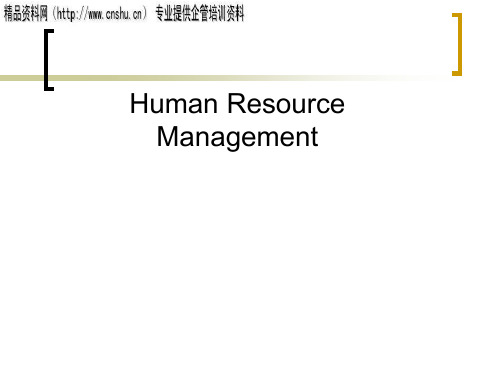
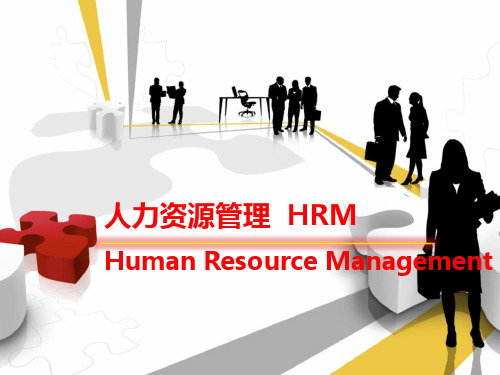
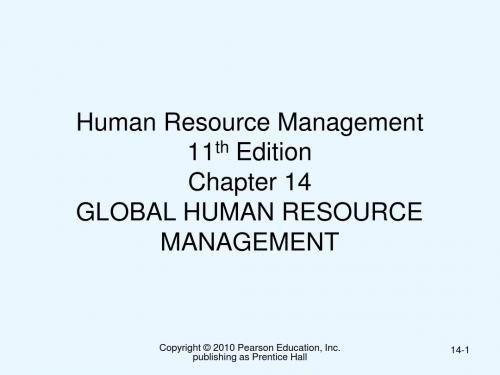

行政管理专业专用词汇英汉对照行政管理专业专用词汇英汉对照随着全球化进程的加速,国际交流和贸易的不断增加,行政管理专业的重要性不断上升。
行政管理涉及到政府、企事业单位等公共机构的管理和运营,因此需要掌握一定的专业词汇。
下面,我们将对常见的行政管理专业词汇进行英汉对照。
1. Administration(行政管理)Administration是指组织和管理人力、物力、财力以及知识等方面的活动。
在行政管理中,该词用来指代公共机构的管理工作。
2. Governance(治理)Governance指的是政府、组织或公司在社会中的规则制定和实施。
在行政管理中,该词指代公共政策的制定和执行。
3. Accountability(问责制)Accountability指的是公共机构或政府应对公共的行政行为和决策做出解释和负责的制度。
4. Bureaucracy(官僚主义)Bureaucracy指的是官僚机构的规范化和规则化运作方式。
在行政管理中,该词用来指代政府内部的官僚机构运作方式。
5. Budget(预算)Budget是指政府、企事业单位等公共机构在一定周期内规划和准备的资金支出计划。
6. Policy(政策)Policy指的是政府或公共机构为达成特定目标而采取的标准和方式。
7. Regulation(规章制度)Regulation是制定并施行的政府、组织或公司等机构内部的规章制度。
在行政管理中,通过规章制度来规定各部门的权利和义务,保障公共机构的正常运作和公共利益的最大化。
8. Public Administration(公共行政)Public Administration是指公共机构组织、运作和控制中的原则、方法和技术。
在行政管理中,该词用来指代公共机构的管理过程和方法。
9. Red Tape(繁琐的程序)Red Tape指的是因为官僚主义而导致的繁琐的行政程序。
在行政管理中,该词用来指代政府或公共机构内部的决策和行动的繁琐程序。

人力资源术语人力资源术语是指在人力资源管理领域中常用的术语和概念。
人力资源管理是一个涉及到组织内部员工的综合性管理系统,在实践中需要运用到各种术语来指导和支持其工作的开展。
本文将介绍一些常见的人力资源术语,以帮助读者更好地理解人力资源管理的工作内容和方法。
1. 人力资源管理(Human Resource Management, HRM)人力资源管理是指组织通过合理规划、组织、指导、控制和激励等手段,以实现组织目标和员工个人发展为核心的一系列管理活动。
2. 人才管理(Talent Management)人才管理是指通过引进、培养和激励人才,以满足组织战略目标的需要。
3. 招聘(Recruitment)招聘是指根据组织的需求,通过各种渠道和方式寻找并筛选适合岗位的人才。
4. 招聘渠道(Recruitment Channels)招聘渠道是指组织用来发布招聘信息和吸引人才的途径,如招聘网站、人力资源公司、校园招聘等。
5. 培训(Training)培训是指组织为员工提供系统性的教育和培训,以提升员工的知识和技能水平。
6. 培训需求分析(Training Needs Analysis)培训需求分析是指通过调查和分析员工的能力和知识差距,确定员工的培训需求。
7. 绩效管理(Performance Management)绩效管理是指通过制定评估标准和进行绩效评估,对员工的工作表现进行监控和评价。
8. 360度评估(360-degree Evaluation)360度评估是一种多方位评估方法,将员工的绩效评价从多个角度进行,包括上级、同事、下属等。
9. 激励(Incentives)激励是指通过给予奖励、晋升、薪酬等方式,以激发员工的积极性和工作动力。
10. 团队建设(Team Building)团队建设是指通过各种活动和训练,加强团队成员之间的合作和沟通,提高团队绩效。
11. 薪酬管理(Compensation Management)薪酬管理是指根据员工的工作职责和绩效,制定和管理员工的薪酬政策和体系。
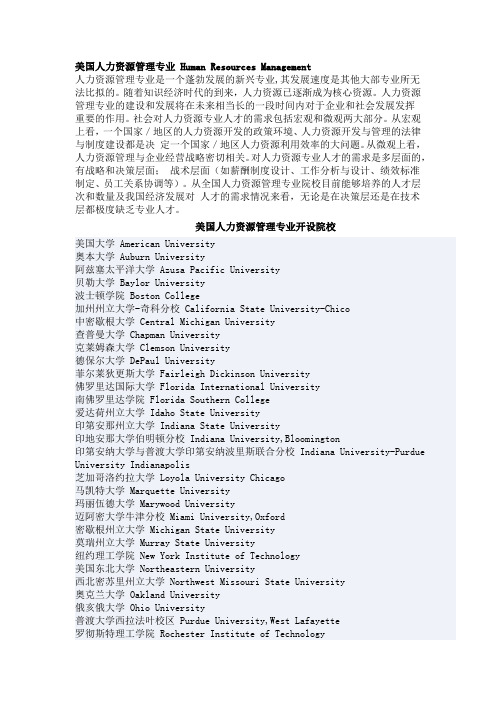
美国人力资源管理专业 Human Resources Management人力资源管理专业是一个蓬勃发展的新兴专业,其发展速度是其他大部专业所无法比拟的。
随着知识经济时代的到来,人力资源已逐渐成为核心资源。
人力资源管理专业的建设和发展将在未来相当长的一段时间内对于企业和社会发展发挥重要的作用。
社会对人力资源专业人才的需求包括宏观和微观两大部分。
从宏观上看,一个国家/地区的人力资源开发的政策环境、人力资源开发与管理的法律与制度建设都是决定一个国家/地区人力资源利用效率的大问题。
从微观上看,人力资源管理与企业经营战略密切相关。
对人力资源专业人才的需求是多层面的,有战略和决策层面;战术层面(如薪酬制度设计、工作分析与设计、绩效标准制定、员工关系协调等)。
从全国人力资源管理专业院校目前能够培养的人才层次和数量及我国经济发展对人才的需求情况来看,无论是在决策层还是在技术层都极度缺乏专业人才。
美国人力资源管理专业开设院校美国大学 American University奥本大学 Auburn University阿兹塞太平洋大学 Azusa Pacific University贝勒大学 Baylor University波士顿学院 Boston College加州州立大学-奇科分校 California State University-Chico中密歇根大学 Central Michigan University查普曼大学 Chapman University克莱姆森大学 Clemson University德保尔大学 DePaul University菲尔莱狄更斯大学 Fairleigh Dickinson University佛罗里达国际大学 Florida International University南佛罗里达学院 Florida Southern College爱达荷州立大学 Idaho State University印第安那州立大学 Indiana State University印地安那大学伯明顿分校 Indiana University,Bloomington印第安纳大学与普渡大学印第安纳波里斯联合分校 Indiana University-Purdue University Indianapolis芝加哥洛约拉大学 Loyola University Chicago马凯特大学 Marquette University玛丽伍德大学 Marywood University迈阿密大学牛津分校 Miami University,Oxford密歇根州立大学 Michigan State University莫瑞州立大学 Murray State University纽约理工学院 New York Institute of Technology美国东北大学 Northeastern University西北密苏里州立大学 Northwest Missouri State University奥克兰大学 Oakland University俄亥俄大学 Ohio University普渡大学西拉法叶校区 Purdue University,West Lafayette罗彻斯特理工学院 Rochester Institute of Technology罗格斯大学新伯朗士威校区 Rutgers University New Brunswick萨姆休斯顿州立大学 Sam Houston State University桑佛德大学 Samford University索诺马州立大学 Sonoma State University圣约翰大学 St.John's University纽约州立大学奥斯威戈分校 State University of New York-Oswego美国天主教大学 The Catholic University of America乔治华盛顿大学 The George Washington University斯克兰顿大学 The University of Scranton德州大学阿灵顿分校 The University of Texas at Arlington托莱多大学 The University of Toledo犹他大学 The University of Utah特洛依州立大学 Troy State University纽约州立大学水牛城分校 University at Buffalo State University of New York 中央俄克拉荷马州立大学 University of Central Oklahoma辛辛那提大学 University of Cincinnati丹佛大学 University of Denver底特律大学 University of Detroit Mercy佛罗里达大学 University of Florida爱达荷大学 University of Idaho马里兰大学帕克分校 University of Maryland College Park迈阿密大学 University of Miami内布拉斯加大学奥马哈分校 University of Nebraska at Omaha内布拉斯加大学林肯分校 University of Nebraska Lincoln内华达大学拉斯维加斯校区 University of Nevada Las Vegas内华达大学里诺校区 University of Nevada Reno纽黑文大学 University of New Haven北德克萨斯州大学 University of North Texas宾夕法尼亚大学 University of Pennsylvania南卡罗来纳大学哥伦比亚分校 University of South Carolina Columbia圣路易斯华盛顿大学 Washington University in St Louis韦伯州立大学 Weber State University卫奇塔州立大学 Wichita State University莱特州立大学 Wright State University扬斯敦州立大学 Youngstown State University美国人力资源管理(HR)专业申请八大要点随着人力资源领域在国内的日渐走俏,留美申请HR硕士的人数也逐渐增多。
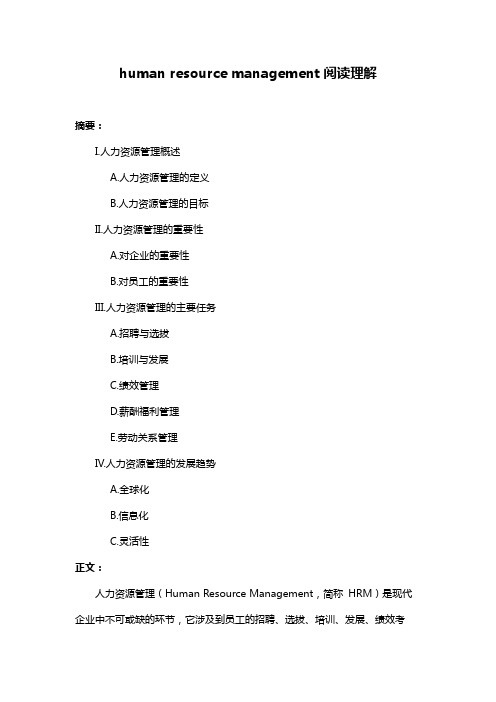
human resource management阅读理解摘要:I.人力资源管理概述A.人力资源管理的定义B.人力资源管理的目标II.人力资源管理的重要性A.对企业的重要性B.对员工的重要性III.人力资源管理的主要任务A.招聘与选拔B.培训与发展C.绩效管理D.薪酬福利管理E.劳动关系管理IV.人力资源管理的发展趋势A.全球化B.信息化C.灵活性正文:人力资源管理(Human Resource Management,简称HRM)是现代企业中不可或缺的环节,它涉及到员工的招聘、选拔、培训、发展、绩效考核、薪酬福利以及劳动关系等多个方面。
对于企业来说,有效的HRM 能够提高员工的满意度,降低员工的流失率,从而提高企业的整体竞争力。
对于员工来说,良好的HRM 能够保障他们的权益,提供良好的工作环境和发展机会。
首先,我们需要明确人力资源管理的定义。
人力资源管理是指企业为实现其发展战略和经营目标,通过制定、实施和监控人力资源政策和活动,以提高员工的工作效率和满意度,从而提高企业绩效的过程。
其次,我们需要了解人力资源管理的重要性。
对企业来说,有效的HRM 能够提高员工的工作效率和满意度,从而提高企业的整体竞争力。
对员工来说,良好的HRM 能够保障他们的权益,提供良好的工作环境和发展机会。
人力资源管理的主要任务包括招聘与选拔、培训与发展、绩效管理、薪酬福利管理和劳动关系管理。
招聘与选拔是企业获取合适人才的重要手段,培训与发展是提升员工能力,实现企业长远发展的重要途径,绩效管理是衡量员工工作效果,激励员工提高工作积极性的有效方式,薪酬福利管理是激励员工,提高员工满意度的关键环节,劳动关系管理则是维护良好的劳动关系,保障企业稳定运行的重要工作。
最后,我们来看一下人力资源管理的发展趋势。
随着全球化的深入,企业的人力资源管理也需要适应全球化的要求,如招聘国际化的员工,建立全球化的培训体系等。
随着信息化的进步,企业的人力资源管理也需要充分利用信息化手段,如使用人力资源管理系统,进行在线培训等。

Define human resource managementRefers to the practices and policies you need to carry out the personnel aspect of your management job, specially, acquiring, training. Appraising, rewarding and providing a safe ethical and fair environment for your company employees.Describe how human resource management differs from personnel management.For personnel management: Time: this is a short term management, Planning: the employees only reactive accept company’s order, employees are the same, give they low trust, don’t have creative suggestion ,locate at company’s marginal, isn’t company’s core. Structure: adapt mechanistic structure, the power is centralized. Specialized: each department have little teamwork.For HRM: Time: this is a long term management Planning: employees can proactive take some creative suggestions, and employees are a part of company they are individual, and have different Characteristics, through different wages distinguish they. And give them high trust. Adapt organic structure, the power is scattered. Line management: think teamwork between different departments work as supplementary role.Personnel management is often considered an independent function of an organization. Human resource management, on the other hand, tends to be an integral part of overall company function. Personnel management is typically the sole responsibility of an organization's personnel department. With human resources, all of an organization's managers are often involved in some manner, and a chief goal may be to have managers of various departments develop the skills necessary to handle personnel related tasks. As far as motivators are concerned, personnel management typically seeks to motivate employees with such things as compensation, bonuses, rewards, and the simplification of work responsibilities. From the personnel management point of view, employee satisfaction provides the motivation necessary to improve job performance. The opposite is true of human resources. Human resource management holds that improved performance leads to employee satisfaction. With humanresources, work groups, effective strategies for meeting challenges, and job creativity are seen as the primary motivators.In the evolution of personnel and human resource management, four major stages can be discerned:(a)social justice(b)h uman bureaucracy(c)consent by negotiation(d)organisation and integrationSocial justiceSocial justice (the budding stage of human resource management), generally refers to the idea of creating an egalitarian society or institution that is based on the principles of equality and solidarity, that understands and values human rights, and that recognizes the dignity of every human being. It is the early stage of which is in the 19th century, that is, the time of the first Industrial Revolution. In this period, the Factory System emerged, and the fair treatment and a fair share of interest will give individuals and social groups developed gradually. The later stage of Social Justice is in the late 19th century an early 20th century, that is, the time of the second Industrial Revolution. In this stage, the most development is new initiatives, such as unemployment benefit, sick pay and subsidized housing.This stage reformer: Robert OwenRobert Owen (14 May 1771 – 17 November 1858), who was born in Newtown, Wales, was a social reformer and one of the founders of socialism and the cooperative movement. He was a social pioneer in personnel management as well.Owen's philosophy is: Good people engaged in management will give employers benefits. It was based on three intellectual pillars: First, no one was responsible for his will and his own actions because his whole character is formed independently of himself; people are products of their environment, hence his support for education and labour reform, rendering him a pioneer in human capital investment. Second, all religions are based on the same ridiculous imagination, that make man a weak, imbecile animal; a furious bigot and fanatic; or a miserable hypocrite; Third, support for the putting-out system instead of the factory system. He also strives to rise the minimum age for child labor and reduce the working hours.Human bureaucracyHuman Bureaucracy is in the early 20th century, which was the period of the First World War. It combined organizational structure, procedures, protocols, and set of regulations in place to manage activity, usually in large organizations. A bureaucracy is directly responsible to the leadership that creates it, such as a government executive or board of directors, As a matter of practicality, the bureaucracy is where the individual will interface with an organization such as a government etc., Large-scale industrial organizations.One of Social scientists in this stage is Frederick Taylor (1856-1915), the father of scientific management. He emphasis that managers must co-operate with workers to ensure the job is done in a scientific way and put forward the separation of management and labor. He develops his ideas on scientific management. Taylor advocates scientific selection of workers based on qualifications and also argues for incentive-based compensation systems to motivate employees.Consent by negotiationConsent by negotiation is the stage of development which is in the period From 1950s to 1960s. In this phase, it has Full employment and labors become scare resource. The most important achievements are: Collective bargaining role, Growth in trade-union, University course and Advisory service. In the U.S., a tremendous surge in union membership between 1935 and 1950 leads to a greater emphasis on collective bargaining and labor relations within personnel management. Compensation and benefits administration also increase in importance as unions negotiate paid vacations, paid holidays, and insurance coverage.Organization and integrationOrganization and integration, the integrated phase of human resource management, is from the early 1970s to 1980s. In this period, it was focus on changing environment. Such as individual experts in organization, Specific areas: recruitment and training, Growth in specialist techniques and Personal growth.Strategic managementStrategic management as a discipline originated in the 1950s and 1960s. it is a field that deals with the major intended and emergent initiatives taken by general managers on behalf of owners, involving utilization of resources, to enhance the performance of firms in their external environments. It is a level of managerial activity under setting goals and over Tactics. Strategicmanagement provides overall direction to the enterprise and is closely related to the field of Organization Studies.One influential pioneer is Alfred Chandler. He recognized the importance of coordinating the various aspects of management under one all-encompassing strategy. Prior to this time the various functions of management were separate with little overall coordination or strategy. Interactions between functions or between departments were typically handled by a boundary position, that is, there were one or two managers that relayed information back and forth between two departments. Chandler also stressed the importance of taking a long term perspective when looking to the future.What are the key functions of human resource management?The human resource management key functions as follows.Human resource planning: The enterprise will arrange the appropriate person to the suitable operating post on; lets the staff displays own ability fully.Recruitment and selection of employees: At this began, an analysis of the job to be done written into a job description so that the selectors know what physical and mental characteristics applicants must possess, what qualities and attitudes are desirable and what characteristics are a decided disadvantage. According to operating post which needs to supplement, determined that needs the staff condition, then through the plan, the employment advertise, test, evaluation, selects, gain enterprise to need the personnel.Employee relations: provides good environment for the staff, increases between them the exchange and the cooperation, strives for to realize between the staff the creative cooperation, establishes the harmonious functional relationship.Pay and reward: To retain good staff and to encourage them to give of their best while at work requires attention to the financial and psychological and even physiological rewards offered by the organization as a continuous exercise.The enterprise needs to construct the comprehensive salary system (Post appraisal and salary rank, salary investigation, salary plan, salary structure, salary system's formulation, salary system's adjustment, labor cost calculation). According to achievements appraisal and feedback to implement reward.Job design and evaluation: According to the enterprise future development to design andprepare the job to choose the suitable staff. Through the efficiency which works to them, post adaptiveness to carries on the achievements appraisal.Training and development: In general, education is 'mind preparation' and is carried out remote from the actual work area, training is the systematic development of the attitude, knowledge, skill pattern required by a person to perform a given task or job adequately and development is 'the growth of the individual in terms of ability, understanding and awareness'. Training to the staff, enables them to have a deeper understanding to own work. Sharpens own various aspects ability unceasingly, will make own contribution to enterprise's future, consummate own professional profession.Additional functions: Explained company policy and working routine, let the staff understand company's working habit;Control the labor force cost, realizes the benefit maximization; Create and maintain employee's morale, lets them maintains the high efficiency work.。